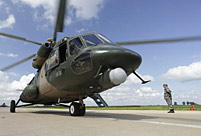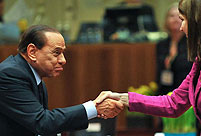 Air Forces arrive at designated area to join China-Russia drill
Air Forces arrive at designated area to join China-Russia drill
 High temperature hits Shanghai
High temperature hits Shanghai
 Old town Dali hosts int'l photography exhibition
Old town Dali hosts int'l photography exhibition
 Death toll rises to 29 in rain-related accidents across Pakistan
Death toll rises to 29 in rain-related accidents across Pakistan
 Baby returned to parents after allegedly being trafficked
Baby returned to parents after allegedly being trafficked
 Nutrica recalls Karicare infant formula in New Zealand
Nutrica recalls Karicare infant formula in New Zealand
 Sexy models in CFGP race
Sexy models in CFGP race
 Child labor still remains rampant in war-hit Afghanistan
Child labor still remains rampant in war-hit Afghanistan
 Sun Yang the star of last day at World Swimming Championships
Sun Yang the star of last day at World Swimming Championships
Washington's update of sea power as an instrument of US national strategy has its critics. The update now brings air power into the "pivot" to Asia. This rebalancing supports a US multidecade military, diplomatic, economic, and political strategy.
Some analysts in Asia say that because the US is bogged down in the Middle East, it will pay less attention to the Asia-Pacific region. This is wishful thinking on the part of those who don't want to see an increasing US presence.
In fact, the deployment of US military forces in the Asia-Pacific region is steadily rising and will continue to rise.
The long-term aspects of this policy are symbolized in the massive construction project in Guam intended to anchor US forward sea power in the Pacific for the next half-century. New generations of technologically advanced ships are being developed and deployed to the region.
While many focus on the naval aspect of the rebalancing in the Pacific, increasing US air power this year and next year will be sharply in evidence.
For starters, US military aircraft will be deployed to Thailand, India, Singapore and Australia.
According to General Herbert Carlisle, the chief of US Air Force operations in the Pacific, such deployments include fighters, tankers, and bombers. The Korat air base will be used in Thailand, the Changi East air base will be used in Singapore, and the Darwin and Tindal air bases will be used in Australia. The Kubi Point and Puerto Princesa airfields in the Philippines are under consideration, as are some air fields in Indonesia.
The navy and marines have already begun their rebalancing. New littoral combat ships are being based in Singapore. The US Marine Corps is refurbishing old WWII airstrips on some Pacific islands such as Tinian.
While all this hard power is in the process of deployment, there are various concepts for how to use it. This esoteric debate on strategy has consequences including possible nuclear warfare.
The Air-Sea Battle concept is seen as being specifically aimed at China and is controversial. Under this concept, the US would attack deep into Chinese territory with missile strikes while at the same time containing its sea power.
While the debate on concepts continues, hard power deployments are visibly increasing. The rise of China is the issue that these military deployments and debates on war fighting strategy seek to address.
So what sort of thinking does all this represent and where is all this headed in the future?
There are many ways of using history to think about national strategy, and this is standard fare at military academies all over the world. During the Cold War, a certain interpretation of Thucydides, an ancient Greek historian, spread through the US academic and policy world, where it has had a lasting effect. This interpretation emphasized power politics and a militarization of foreign policy.
Although Thucydides himself was a staunch critic of imperialism, present day strategists use him to design and to justify a policy of US hegemony. Sea power was the basis of Athens' ever expanding empire, and so many modern US strategists emphasize this dimension of national power. Now they combine sea power with air power.
The famous historian made the specific point that war arose between the rival city-states of Athens and Sparta based on fear. What he meant was the fear that each rival had about the other took its allies away from it and thus changing the balance of power between them.
He makes clear that this zero-sum thinking ultimately precluded diplomatic arrangements on a win-win basis for peace and cooperation.
In today's world, Washington's policy of retaining, and even increasing, its allies within a tight military and economic framework are nothing new. But, critics say that in the evolving multipolar world, the provocative projection of hard power can increase tension and lead to war.
While looking ahead to the rest of this century, Washington must avoid zero-sum thinking and a costly and unnecessary policy of hard power provocation.
 Air Forces arrive at designated area to join China-Russia drill
Air Forces arrive at designated area to join China-Russia drill  Hospital comes to aid of tragic family of ‘Chinese Cabbage Dad’
Hospital comes to aid of tragic family of ‘Chinese Cabbage Dad’ Czech artist performs bubble show at Hong Kong mall
Czech artist performs bubble show at Hong Kong mall  Italian Supreme Court confirms Berlusconi's jail verdict
Italian Supreme Court confirms Berlusconi's jail verdict Run naked as punishment for missing sales target
Run naked as punishment for missing sales target International Grand Bazzar in Urumchi,Xinjiang
International Grand Bazzar in Urumchi,Xinjiang  Chinese troops of "Peace Mission - 2013" arrive at exercise area
Chinese troops of "Peace Mission - 2013" arrive at exercise area Pakistan's rain-triggered accidents claim 29 lives: media
Pakistan's rain-triggered accidents claim 29 lives: media Anti-hijacking drill held on train in Wuhan
Anti-hijacking drill held on train in Wuhan Top 10 most dangerous jobs in the world
Top 10 most dangerous jobs in the world Zhang Ziyi graces Femina magazine
Zhang Ziyi graces Femina magazine Breathtaking images of extreme sports
Breathtaking images of extreme sportsDay|Week|Month